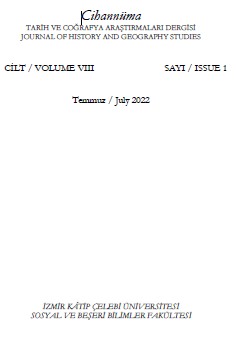BEING A COMRADE OF THE CIDDAVIS: THE SECURITY OF THE CAIRO PILGRIMAGE CARAVAN AND ITS ECONOMIC DIMENSIONS IN THE EIGHTEENTH CENTURY
BEING A COMRADE OF THE CIDDAVIS: THE SECURITY OF THE CAIRO PILGRIMAGE CARAVAN AND ITS ECONOMIC DIMENSIONS IN THE EIGHTEENTH CENTURY
Author(s): Abdulmennan M. AltıntaşSubject(s): Economic history, International relations/trade, Security and defense, Military policy, 18th Century, The Ottoman Empire
Published by: İzmir Kâtip Çelebi Üniversitesi, Sosyal ve Beşeri Bilimler Fakültesi
Keywords: Egypt; Red Sea; pilgrimage caravan; Ciddavi Unit; Janissaries;
Summary/Abstract: The Ottoman sultans, who bore the title “Servant of the Two Holy Sanctuaries”, assumed many responsibilities related to Mecca and Medina and their pilgrimage affairs, including the security of pilgrims, pilgrimage routes, and of the Holy Cities themselves. During the Ottoman period, these security services were mainly provided both by soldiers located in Mecca and Medina, and by troops who were sent from the provinces of Damascus and Egypt. This study evaluates the role of the Ciddavi (Ar. Jiddawi) soldiers recruited from the seven corps of Egypt to escort the pilgrimage caravans under the command of the serdar-ı kitar (commander of the military force escorting pilgrims) of Egypt, returning to Cairo at the end of the pilgrimage season. In this context, the military structure and remit of the Ciddavi Unit will be examined by focusing on the imperial edicts in the mühimme-i Mısır registers. This study reveals that the Janissaries were the most powerful and influential military corps within the Ciddavi Unit and they used this power to benefit their commercial interests. The soldiers who went to Mecca and Jeddah from Cairo for pilgrimage services created commercial opportunities for the Janissary Corps, which had a great interest in the Red Sea trade. Janissary commanders and soldiers of the Ciddavi Unit, together with the Egyptian merchants and artisans under their protection, became inconspicuous, yet important, parts of the international trade conducted between the Red Sea and the Mediterranean.
Journal: Cihannüma: Tarih ve Coğrafya Araştırmaları Dergisi
- Issue Year: VIII/2022
- Issue No: 1
- Page Range: 79-100
- Page Count: 22
- Language: English

